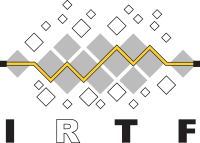Scalable Adaptive Multicast Research Group SAMRG
Concluded
Charter
The Scalable Adaptive Multicast Research Group (SAMRG) is chartered to explore and research techniques which improve multicast performance with respect to dimensions such as number of groups, dynamics of group membership, dynamics of the network topology, and network resource constraints. The SAMRG will investigate approaches based on application layer multicast (ALM), overlay multicast (OM), and native IP multicast, as well as hybrid approaches. A key design consideration is the placement of multicast state information along the multicast path, including packet headers, end hosts, and network nodes, where placement may be determined adaptively.
In SAM architectures, new protocols are expected to coexist and integrate with native IP multicast protocols while offering more flexible deployment options and scaling to support a greater number of simultaneous multicast groups. Alternative technologies such as end-system multicast and overlay multicast have been demonstrated, but these mechanisms must be integrated into a unified architecture and operational design.
Among the challenges to be addressed are: multicasting in topologies with concatenated VPNs, such as the Global Information Grid (GIG); ability to incorporate QoS mechanisms while retaining scalability; integration with network- and application-layer security mechanisms; and adaptation schemes which consider group-related factors, such as group size, number of sources, membership dynamics, sensitivity to delay, amount of state, state update rate, application data rate, and other application-specific parameters, as well as network-related factors, such as dynamics of topology, carrying capacity, and connectivity.
Methods will be explored for group formation and discovery that scale to large numbers of groups, accommodate highly dynamic group membership, and support user-initiated small-group multicast in which the group is defined as a set of explicitly addressed endpoints. Further challenges include efficient multicast for limited-resource nodes and access links, control mechanisms for hybrid systems, approaches to optimization in the network, including routing, and operation in mobile networks, including Mobile Ad-hoc Networks (MANET).
Deploying, diagnosing, debugging, and managing multicast services is complex, particularly for services which span multiple administrative domains. The SAMRG will propose and evaluate tools and strategies for deployment, operations, and management of SAM services.
The SAMRG will select candidates for analysis and evaluation from existing research results. Researchers are invited to submit new approaches for further investigation. Through experimentation, the SAMRG seeks to deepen its understanding of the solution space and to enable the identification of preferred solutions as a function of dynamic network characteristics and the number of multicast sources, receivers, and groups.
The expected findings of the SAMRG include characterizing the problem space, including driving scenarios, comparisons and analysis of existing approaches, a SAM framework that supports multiple ALM/OM/native/hybrid protocols, analysis of network infrastructure impact when multicast traffic becomes a dominant flow in a network, and deployment scenarios which are independent of but can support and evolve with network infrastructure support for native multicast. The findings are expected to be published in technical reports, academic papers, and/or RFCs.
Membership
The SAMRG operates in an open fashion (meetings and mailing lists) but may occasionally form restricted subgroups to facilitate the development of specific work items. Periodic status reports will be provided to the full group regarding any closed activities undertaken by the SAMRG. The SAMRG seeks to attract a healthy mix of academic and industry participants.
Meetings
Meetings will be held 2-3 times a year, sometimes co-located with other events (e.g., IETF meetings, conferences, etc.) and sometimes independently. In particular, the SAMRG aims to work with the ALM/OM research community by convening special-topic meetings during academic and industry conferences in related fields. The SAMRG also seeks input and participation from researchers involved in ongoing GIG system engineering activities.
Concluded Group
This Research Group has completed its work and is no longer active.
The charter and other information on this page is provided as a record of history. Email addresses and links may no longer function.
For inquiries about this former Research Group please email irtf-discuss@irtf.org.
Timeline
The SAMRG concluded its work on 2013-12-17.
Chairs
The SAMRG was chaired by John Buford and Thomas Schmidt when it closed.
Mailing List
The SAMRG mailing list was sam@irtf.org. It is archived here.
Web Page
Additional SAMRG information is (or was) available at https://samrg.org/.
